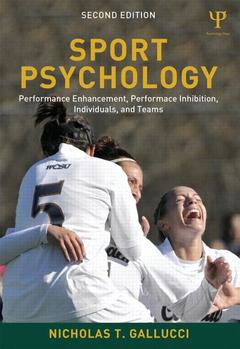Sport Psychology (2nd Ed.) Performance Enhancement, Performance Inhibition, Individuals, and Teams
Auteur : Gallucci Nicholas T.

Sport Psychology, 2nd Edition provides a synthesis of the major topics in sport psychology with an applied focus and an emphasis on achieving optimal performance.
After exploring the history of sport psychology, human motivation, and the role of exercise, there are three main sections to the text: Performance Enhancement, Performance Inhibition, and Individuals and Teams.
The first of these sections covers topics such as anxiety, routines, mental imagery, self-talk, enhancing concentration, relaxation, goals, and self-confidence.
The section on Performance Inhibition includes chapters on choking under pressure, self-handicapping, procrastination, perfectionism, helplessness, substance abuse, and disruptive personality factors.
While much of the information presented is universally applicable, individual differences based on gender, ethnicity, age, and motivation are emphasized in the concluding section on Individuals and Teams.
Throughout, there are case studies of well-known athletes from a variety of sports to illustrate topics that are being explored.
Part 1. Introduction. 1. Introduction to Sport Psychology. 2. Motivation for Sport and Achievement. 3. Exercise. Part 2. Performance Enhancement. 4.Optimal Levels of Anxiety, Intensity, or Arousal. 5. Pre-performance Routines. 6. Mental Skills Training: Self-Talk, Concentration, Mental Imagery. 7. Relaxation Training: Calming the Physiology. 8. Goals. 9. Goal Orientation. 10. Self-efficacy and Sport Self-confidence. Part 3. Performance Inhibition. 11. Choking Under Pressure and Anxiety and Performance. 12. Self-handicapping. 13. Procrastination and Perfectionism. 14. Learned Helplessness. 15. Performance Inhibition Due to Personality Factors. 16. Substance Abuse. 17. Burnout. 18. Sport Injuries. Part 4. Individuals and Teams. 19. Gender and Sport. 20. Ethnic and Cultural Differences and Sport Psychology. 21. Youth and Sport. 22. Leadership and Coaching. 23. Team Cohesiveness.
Nicholas T. Gallucci is a professor in the Department of Psychology at Western Connecticut State University. He received MA and PhD degrees in psychology at the University of Louisville, and a BA in psychology at Vanderbilt University. His research concerns personality and sport performance, and exercise and weight loss. He enjoys running, played intercollegiate soccer at Vanderbilt, and is a member of the St. Xavier High School Athletic Hall of Fame.
Date de parution : 02-2014
17.8x25.4 cm
Date de parution : 02-2014
17.8x25.4 cm
Thème de Sport Psychology :
Mots-clés :
cognitive; interference; mental; toughness; applied; physiological; anxiety; journal; exercise; self-effi; Anabolic Androgenic Steroid; Endorsed Performance Approach Goals; English Premier League; Perfectionistic Strivings; Performance Approach Goals; Performance Avoidance Goals; Preperformance Routines; Ergogenic Substances; Mental Toughness; Exercise Dependence; Quiet Eye Period; Mastery Avoidance Goals; Field Event; Mastery Approach Goals; Physiological Anxiety; Cognitive Interference; Golf Tournaments; Sport Psychology; GPA; Grade Point Averages; Cognitive Anxiety; Young Sportspersons; Adopted Performance Avoidance Goals; Enactive Attainments; National Hockey League



